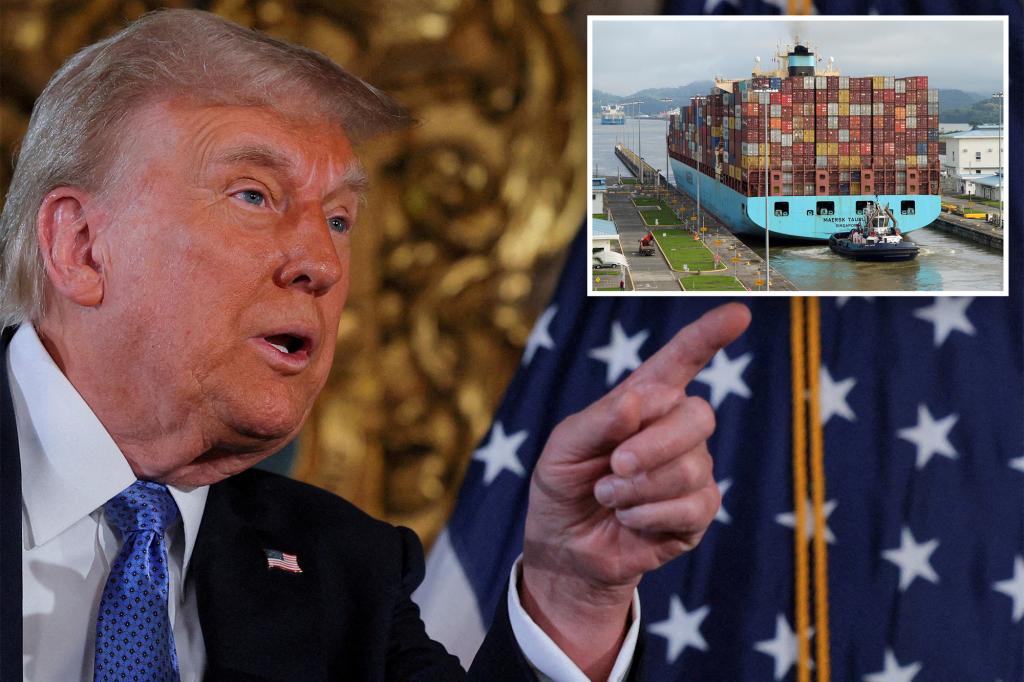Former President Donald Trump’s pronouncements on reclaiming the Panama Canal have ignited a firestorm of controversy, reigniting a long-standing debate about the waterway’s ownership and its significance to the United States. In a series of Truth Social posts, Trump accused Panama of charging “exorbitant” fees for passage through the canal, a vital artery for global commerce and a crucial strategic asset for the U.S. military. He underscored the canal’s importance to American national security and economic interests, citing its role in facilitating rapid naval deployment and the substantial volume of U.S. trade that transits the canal. Trump further argued that the United States, having borne the substantial costs of the canal’s construction, is entitled to its return if Panama fails to adhere to unspecified “moral and legal principles” associated with its management. This bold assertion raises complex legal and geopolitical questions, threatening to strain U.S.-Panama relations and potentially destabilizing a region crucial to international trade.
Trump’s demand for the return of the Panama Canal is rooted in his interpretation of the historical context surrounding its construction and transfer to Panama. He emphasized the significant investment of American lives and resources in the canal’s creation, characterizing former President Jimmy Carter’s decision to transfer control to Panama in 1977 as a “foolish” giveaway. Trump’s narrative frames the transfer as a transaction conditional upon Panama’s adherence to certain principles, which he alleges have been violated due to the allegedly high fees charged for canal usage. This interpretation, however, overlooks the complex negotiations and treaties that led to the canal’s transfer, a process that spanned decades and involved significant diplomatic efforts to address Panamanian sovereignty claims over the Canal Zone. The 1977 Torrijos-Carter Treaties, ratified by the U.S. Senate, established a framework for the gradual transfer of control, culminating in Panama assuming full responsibility for the canal’s operation and defense on December 31, 1999.
The legal basis for Trump’s demand remains unclear. International law recognizes the validity of treaties, and the Torrijos-Carter Treaties have been upheld by both the United States and Panama for decades. Unilaterally demanding the return of the canal would violate these treaties and potentially undermine international law principles regarding the sanctity of agreements. Such a move could severely damage U.S. credibility on the global stage and strain relations with numerous countries, particularly in Latin America. Furthermore, any attempt to seize the canal by force would likely face strong international condemnation and could lead to serious geopolitical consequences.
The economic rationale behind Trump’s argument also warrants scrutiny. While U.S. trade constitutes a significant portion of the canal’s traffic, the revenue generated from transit fees contributes significantly to Panama’s economy. Reclaiming the canal would not only impose significant financial burdens on the United States, requiring substantial investments in operation and maintenance, but also deprive Panama of a vital source of income. Moreover, the complexities of managing such a critical infrastructure project require specialized expertise and a stable operating environment, factors that could be jeopardized by a forced transfer of control.
From a national security perspective, while the Panama Canal remains strategically important to the United States, its importance has arguably diminished in recent decades. The rise of larger vessels that cannot transit the canal and the development of alternative shipping routes have reduced the canal’s criticality for certain types of naval deployments. Furthermore, the U.S. maintains a strong military presence in the region and enjoys cooperative security arrangements with Panama, which would likely be jeopardized by a unilateral seizure of the canal.
Trump’s rhetoric regarding China’s potential influence over the canal also lacks concrete evidence. While Chinese companies have invested in port facilities near the canal, there is no indication of Chinese control over its operations. Invoking the specter of Chinese influence appears to be a tactic aimed at raising alarm and justifying his demands, playing on existing anxieties about China’s growing global presence.
In conclusion, Donald Trump’s pronouncements on reclaiming the Panama Canal represent a significant departure from established U.S. foreign policy and international legal norms. His claims lack a solid legal foundation and disregard the complex historical context surrounding the canal’s transfer to Panama. The economic and national security arguments supporting his position are also questionable. Such rhetoric not only risks damaging U.S.-Panama relations but also undermines international law and could have far-reaching geopolitical consequences. The international community, including the United States, should reaffirm its commitment to upholding the Torrijos-Carter Treaties and respecting Panama’s sovereignty over the canal, ensuring its continued operation as a vital artery for global trade and a symbol of international cooperation.

